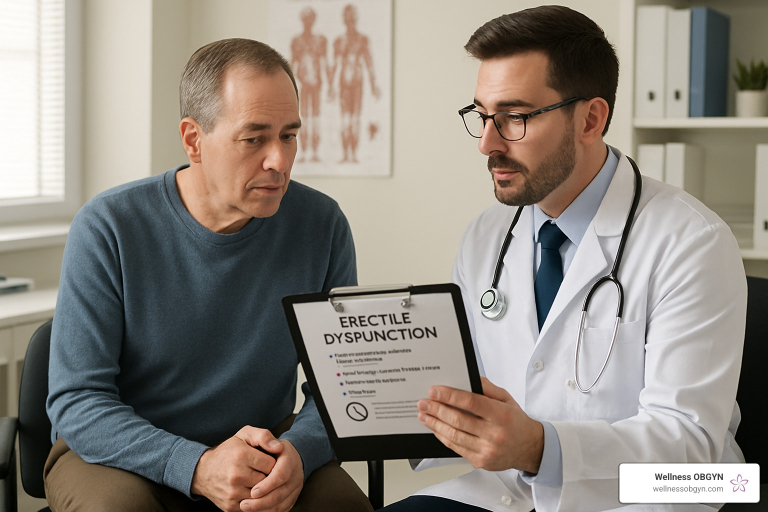
jayrichard.com
This site discusses adult men’s health in plain language.
Click Below For Menu:
Frequently Asked Questions
Erectile dysfunction can feel isolating, but it doesn’t have to be. The questions below come from real concerns men and their partners face every day. Each answer is drawn from the experiences and insights behind "When Pills Stop Working" and "When Hope Feels Lost". You’ll find clear, respectful information here; no gimmicks, no judgment, just straightforward guidance for couples ready to take back their confidence and connection.
Understanding ED
1. What exactly is erectile dysfunction (ED)?
ED is when a man regularly has trouble getting or keeping an erection firm enough for sexual activity. It’s a medical condition, not a sign of weakness or loss of masculinity. Many physical and psychological factors can contribute, and it’s far more common than most people realize.
2. How common is ED?
Very. Millions of men worldwide experience ED at some point, especially as they age. It’s not a rare problem—and modern medicine offers more effective options than ever before.
3. Is ED just about age?
Not entirely. While age increases risk, lifestyle choices, health conditions like diabetes or high blood pressure, and even stress can play major roles. Many men in their 30s and 40s experience ED, too.
4. Does having ED mean my relationship is over?
Not at all. ED challenges intimacy, but it doesn’t define it. Many couples grow closer as they learn to communicate, support each other, and explore solutions together.
Treatment Basics
5. What’s the first step when dealing with ED?
The first step is honesty—with yourself and your doctor. Discuss it openly with a qualified healthcare provider who can look for causes and help guide treatment options.
6. What are the common treatments for ED?
Treatments range from lifestyle changes and oral medications to injections, vacuum devices, and surgical implants. Finding the right solution depends on your specific cause and overall health.
7. What if pills stop working?
That’s normal over time. When pills lose effectiveness, there are still many proven next steps—including injection therapy, vacuum devices, and penile implants that deliver reliable results.
8. Are penile implants safe?
Yes. They’ve been used successfully for decades and have very high satisfaction rates. When performed by an experienced surgeon, they offer a permanent, natural-feeling solution.
9. How long does recovery from implant surgery take?
Most men return to light activity within a few days and full recovery within four to six weeks. Follow-up care and patience make all the difference in long-term success.
10. Will anyone be able to tell I have an implant?
No. Modern implants are fully internal and completely undetectable when not in use. Only you and your partner will know.
When Pills Stop Working
11. Why did the pills that used to work stop working?
Over time, the underlying causes of ED can progress, and medications may lose their effectiveness. This doesn’t mean you’re out of options—it just means it’s time to look at the next level of treatment.
12. What are the advanced options beyond pills?
Advanced options include penile injections, vacuum erection devices, and implants. Each has its benefits, and a specialist can help decide which fits your health and comfort level best.
13. How do I choose the right doctor for ED treatment or surgery?
Look for a urologist who specializes in sexual medicine or implant surgery. Experience matters—a seasoned surgeon has seen a wide range of cases and can guide you through the process confidently.
14. How can I afford treatment if insurance doesn’t cover it?
Some insurance plans cover ED treatments, but not all. Understanding costs and asking about payment plans, manufacturer support, or medical credit options can make it manageable.
15. Is it normal to feel embarrassed about seeking help?
Absolutely—but it shouldn’t stop you. ED is a medical issue, not a moral one. The moment you decide to talk to a professional, you’re already taking control.
16. How does "When Pills Stop Working" help?
The book breaks down every step of the treatment journey, what to expect, how to talk to your doctor, what surgery really involves, and how to rebuild confidence. It gives you real information without the awkwardness.
For Partners
17. How can partners best support someone dealing with ED?
Start with understanding; this isn’t anyone’s fault. Offer reassurance and open conversation. Sometimes just listening without judgment helps more than trying to “fix” it.
18. What if I’m frustrated or hurt as a partner?
That’s valid. ED can be emotionally heavy for both people. Acknowledging your feelings and discussing them openly (without blame) helps keep resentment from growing.
19. How do we talk about ED without it becoming an argument?
Pick a calm moment outside the bedroom, use “we” language, and stay focused on teamwork, not blame. Remember, it’s the two of you against the problem, not each other.
20. How can couples maintain intimacy during treatment?
Shift focus from performance to connection, affection, touch, shared time, and humor all count. Many couples find their bond deepens when pressure lifts.
21. What if my partner doesn’t want to talk about it at all?
Avoid pushing, but don’t ignore it either. Let him know you care and are ready when he’s ready. Sometimes reading a resource like When Hope Feels Lost together helps open the door.
When Hope Feels Lost
22. What’s the message behind When Hope Feels Lost?
Start with understanding; this isn’t anyone’s fault. Offer reassurance and open conversation. Sometimes just listening without judgment helps more than trying to “fix” it.
23. How can partners take care of themselves while supporting someone with ED?
That’s valid. ED can be emotionally heavy for both people. Acknowledging your feelings and discussing them openly (without blame) helps keep resentment from growing.
24. Can ED actually strengthen a relationship?
Yes. Couples who face it together often report more emotional honesty, deeper connection, and renewed appreciation for one another.
About Jay Richard & the Books
25. Why did Jay Richard write these books?
Start with understanding; this isn’t anyone’s fault. Offer reassurance and open conversation. Sometimes just listening without judgment helps more than trying to “fix” it.
These questions only scratch the surface, but they’re a solid place to begin. Every man’s story is different, and every couple’s path to healing takes its own turns. If you’re ready for more detailed guidance, both "When Pills Stop Working" and "When Hope Feels Lost" go deeper; offering step-by-step information, partner perspectives, and the reassurance that you’re not walking this road alone. Start where you are. The rest comes with honest conversation, good information, and a little courage.
Practical solutions backed by experience,
designed for real couples.
About Jay Richard:
Jay Richard writes for men and couples who want straight answers and practical next steps. After years of trial‑and‑error with common ED treatments, he chose a definitive solution and documented the journey so others wouldn’t have to walk it blind. His approach is direct and respectful, no scare tactics, no shame, just what to expect, the trade‑offs, and how to talk with a clinician like an adult.
Jay blends lived experience with careful research and conversations with specialists. He focuses on the decisions that matter: when pills stall out, how to evaluate advanced options, how to involve your partner, and how to reclaim confidence along the way. He lives in Florida, stays active, and continues to collaborate with physicians and patients to keep information current and useful.


Two Companion Books
One for Men, One for Partners
Endorsed by
Dr. William Figlesthaler, MD, FACS.
“As a urologist, I’ve seen how ED affects both men and their partners.
These books offer clarity, encouragement,
and practical resources for the journey.” Dr. Fig
Why These Books Matter
Erectile dysfunction doesn’t just affect men — it touches both partners and the relationship itself. These guides are written with honesty, compassion, and hope, offering couples a clear path forward. Whether you’re the one facing ED or the one walking beside him, these books will help you understand, connect, and grow stronger together.
For Doctors
A Resource for Your Patients This is more than one man’s story—it’s a practical guide filled with lived experience, medical insight, and hope. From pills to advanced solutions, from surgery to recovery, it shows patients (and their partners) what’s possible.
“Endorsed by medical professionals.”

“Courage is required, but the courage
to seek help is far easier than the courage
to keep living with the problem.”
Jay Richard
6017 Pine Ridge Road, Suite #425
Naples, FL 34119
© 2025 Jay Richard | All Rights Reserved.
Web Design By https://pilgrimdigitalassets.com




